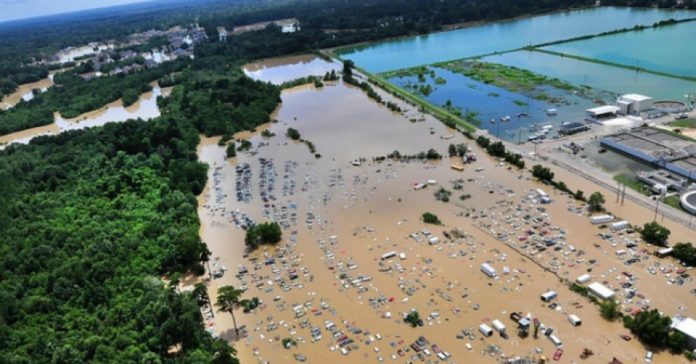
By Lauren McCauley at commondreams.org
An aerial photograph of Baton Rouge, Louisiana after historic flooding destroyed much of the city, August 18, 2016. (Photo: Thomas Cizauskas/cc/flickr)
Multinational firms managing $1.2tn in assets declare subsidies for coal, oil, and gas ‘simply unsustainable’.
Warning that climate change amounts to the “mother of all risks,” three of the world’s biggest insurance companies this week are demanding that G20 countries stop bankrolling the fossil fuels industry.
Multi-national insurance giants Aviva, Aegon, and Amlin, which together manage $1.2tn in assets, released a statement Tuesday calling on the leaders of the world’s biggest economies to commit to ending coal, oil, and gas subsidies within four years.
“Climate change in particular represents the mother of all risks—to business and to society as a whole. And that risk is magnified by the way in which fossil fuel subsidies distort the energy market,” said Aviva CEO Mark Wilson. “These subsidies are simply unsustainable.”
According to a recent report by the International Monetary Fund (IMF), fossil fuel companies receive an estimated $5.3tn a year in global subsidies—a figure that included, as the IMF put it, the “real costs” associated with damage to the environment and human health that are foisted on populations but not paid by polluters.
Tuesday’s declaration is being issued as leaders prepare to convene for the 11th G20 summit, which is being held in Hangzhou, China on September 4-5 under the theme: “Toward an Innovative, Invigorated, Interconnected, and Inclusive World Economy.”
“We’re calling on governments to kick away these carbon crutches, reveal the true impact to society of fossil fuels and take into account the price we will pay in the future for relying on them,” Wilson added.
Indeed, insurance companies are increasingly shouldering many of the costs associated with a warming planet, whether it be from extreme weather damage or reimbursing farmers for lost crops.
In the first half of 2016 alone, natural catastrophes have caused $70bn in losses, of which $27bn was insured, according to an assessment by insurance and reinsurance company Munich RE—with events of particular note being climate-related “storms in the U.S. and Europe, massive forest fires in Canada, and the complete absence of typhoons in the northwestern Pacific.”
And housing data firm Zillow recently published an analysis which found that as many as 1.9 million homes across the country could be underwater by 2100 if the seas rise as much as climate scientists predict, amounting to property losses in the hundreds of billions of dollars.
U.S. President Barack Obama and President Xi Jinping are reportedly planning to jointly announce their ratification of the landmark Paris climate accord later this week ahead of the global summit. And while the COP21 goal of limiting global warming to 2°C is laudable, observers warn that it will not be achieved if nations continue to pour billions of dollars in high-carbon energy sources.
In 2009, G20 leaders agreed to “rationalize and phase out over the medium term inefficient fossil fuel subsidies that encourage wasteful consumption.”
Five years later, this goal rings “empty” to Shelagh Whitley, research fellow at the Overseas Development Institute (ODI), which estimates that such assistance amounts of roughly $444bn each year.
“These subsidies fuel dangerous climate change,” said Whitley. “If we are to have any chance of meeting the 2°C target set at the Paris climate summit then governments need to start a program of rapid decarbonization. The finance sector recognizes the importance of moving away from fossil fuels, governments need to realize they may be the only ones left not moving.”
Adding its voice to the chorus, the Sierra Club recently launched its Fossil Free Financecampaign to encourage G20 governments to stop pouring public money “into the pockets of Big Coal, Oil, and Gas each year, exacerbating the climate crisis, polluting our air and water, opening up new fossil fuel reserves, and hurting our families and communities.”
“In the past seven years, we’ve seen historic climate progress across the U.S. and around the globe,” said Sierra Club executive director Michael Brune. “But while the world moves forward toward a 100 percent clean energy economy, G20 leaders have remained stagnant, with the world waiting on empty promises.”




